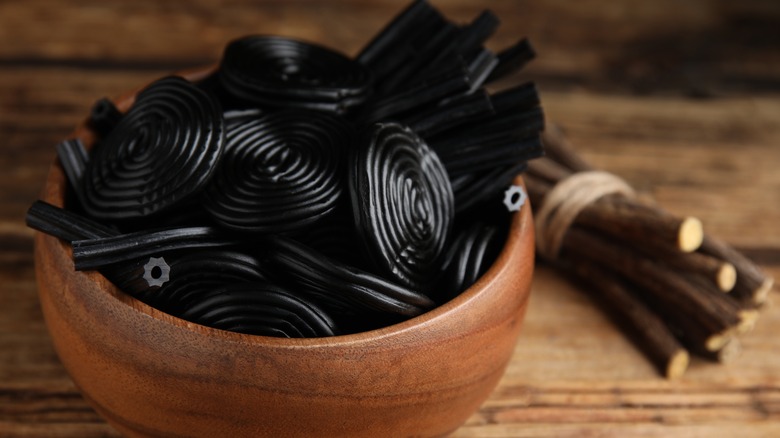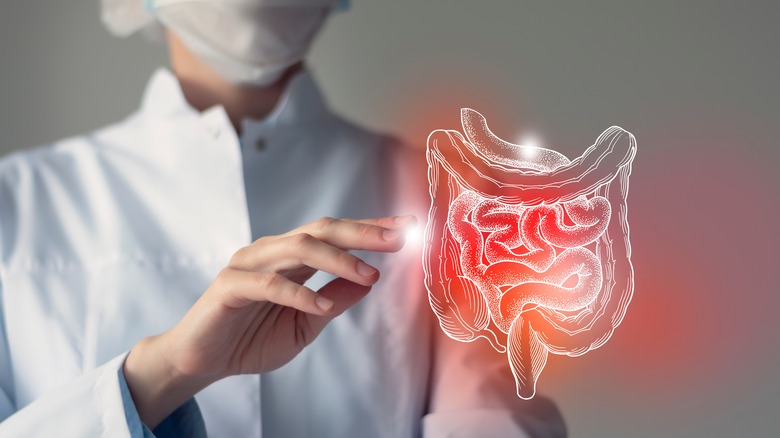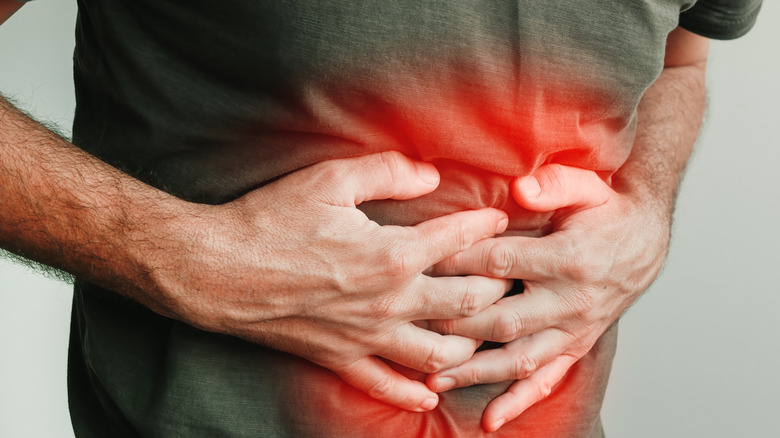Non-Life-Threatening Reasons Your Poop Is Black
Our bodies often communicate important health information in unexpected ways, and one such indicator is the color of our stool. According to the Mayo Clinic, the spectrum of stool colors can be quite broad, ranging from various shades of brown to green, yellow, white, and even black. While it's natural to be alarmed by black stool, it's essential to recognize that not all instances of dark-colored stool are a cause for panic. Per the Cleveland Clinic, the color of your stool is highly influenced by what you eat and drink, as well as how your body processes different substances. Understanding the factors behind these color changes can alleviate unnecessary concerns.
According to the site, certain foods, medications, and supplements can cause temporary changes in stool color, including turning it black. However, black stool can also be attributed to other potentially life-threatening conditions, including internal bleeding in the upper digestive tract. When caused by internal bleeding, doctors refer to black stools as melena, which is the result of blood going from bright red to black as it moves through your digestive system. Therefore, it is crucial to differentiate between melena and harmless, non-lethal black stool caused by specific foods, medications, or benign health conditions. In this article, we will delve into the not-so-glamorous yet very important world of stool colors, shedding light on the non-life-threatening causes of black stool.
You're taking iron supplements
Iron supplements play a vital role in maintaining your body's growth and development, seeing that iron is a mineral essential for the production of hemoglobin, a protein present in red blood cells that carries oxygen from your lungs to your organs, muscles, and other bodily tissues. While most people get enough iron from their diets, certain groups, such as people experiencing heavy menstrual periods, pregnant people, adolescents, vegetarians, and frequent blood donors, often struggle to meet their daily iron requirements (via the National Institutes of Health). To bridge this gap, they might resort to iron supplements, which, according to MedlinePlus, are made of ferrous sulfate, gluconate, or fumarate, and are available in various forms like capsules, tablets, chewable tablets, and liquids.
However, per the Mayo Clinic, a notable side effect of iron supplements is a change in stool color, often turning it from greenish to grayish-black. This change in color, although alarming, is considered normal and is primarily attributed to the iron compounds present in the supplements. Still, it is crucial to be aware of this harmless side effect, especially for those relying on iron supplementation to prevent deficiencies. Nevertheless, despite its non-life-threatening nature, any alteration in stool color should be communicated to a healthcare professional, as dark stools can also result from internal bleeding.
You ate black-died foods
The colorful world of artificial food dyes, often found in candies, drinks, and processed foods, can play a surprising role in changing the hues of your stool, resulting in a spectrum of poop colors that mirrors the rainbow. As gastroenterologist Dr. Christine Lee explains (via the Cleveland Clinic), artificial food coloring can travel through the gastrointestinal tract virtually unchanged, meaning that it may pass without being broken down by the human body's natural processes. Thus, it can exit the body in various vibrant shades, or in this case, a dark shade of black. Per Dr. Lee, this is particularly common in children, who might indulge in colored candies more often than adults.
Similarly, as Dr. Anish Sheth, gastroenterologist and co-author of the book "What's Your Poo Telling You," states (via Mic), unlike natural foods that undergo significant alterations during digestion, artificial food dyes, when consumed in large quantities, "manifest" in the stool, leading to a stark contrast between the way they look when ingested and their appearance upon exiting the body. This phenomenon serves as a vivid example of how what we eat can directly influence the colorful spectrum of our stools, offering a playful reminder of the intricate processes that go about within our digestive systems.
You're taking Pepto Bismol
Pepto Bismol is a familiar over-the-counter remedy trusted by many to alleviate symptoms of nausea, heartburn, indigestion, upset stomach, and diarrhea (via Pepto Bismol). Yet, it contains a peculiar ingredient that can lead to a surprising change in the color of your stool. After taking Pepto Bismol, you might notice your stool and even your tongue appearing darker, often taking on a striking black hue. This startling discoloration is entirely harmless and typically fades within a few days once you discontinue its use.
According to Healthline, the active ingredient in Pepto Bismol is bismuth subsalicylate, a compound that, when ingested, has the ability to alter the color of your stool. This transformation happens as the compound meets small amounts of sulfur in your body, which can be present in your saliva or throughout your digestive system. When bismuth subsalicylate and sulfur come into contact, they combine to form bismuth sulfide, a compound with a distinct black color, and as it makes its way through your gastrointestinal tract, it dyes your stools in its dark shade. Per Pepto Bismol, the intensity and duration of the discoloration can vary and is influenced by the amount of sulfur in your body at the time of taking the medicine, your individual bowel habits, age-related changes in the intestinal tract (as it tends to slow down with age), and the amount of Pepto Bismol consumed. Nevertheless, seek advice from your healthcare provider if your stool has had an unexpected color change and you haven't taken Pepto Bismol in the past few days.
You have a Mallory-Weiss tear
Mallory-Weiss tears, though non-life-threatening in most cases, can lead to symptoms like black or tar-like stools, which are an indication of internal esophageal bleeding. According to Johns Hopkins Medicine, the esophagus, a tube that connects the throat to the stomach, can tear on its lower end due to violent coughing, vomiting, or other scenarios that increase abdominal pressure (such as childbirth or heavy lifting). Once torn, the area can start to bleed, manifesting symptoms such as bright red vomit, vomit resembling coffee grounds, weakness, dizziness, chest pain, paleness, breathlessness, and diarrhea, in addition to black stools.
Per WebMD, Mallory-Weiss tears are common enough that they are accountable for up to 15% of reported upper gastrointestinal bleeding cases that have been linked to black stools, and it's believed that many mild cases go undiagnosed. The tears can affect individuals of all ages, including children. Yet, they are more common among middle-aged adults and in men than in women. Notably, since excessive alcohol consumption significantly increases the risk of vomiting, this is a risk factor known to elevate the likelihood of developing Mallory-Weiss syndrome. Fortunately, per Johns Hopkins Medicine, Mallory-Weiss tears typically stop bleeding and heal on their own, with severe internal bleeding being rare.
You consumed activated charcoal
Activated charcoal, a black, odorless, and flavorless powder, is well-known for its various applications, ranging from food and nonfood products to emergency medical use. In fact, it is believed to promote kidney function, alleviate symptoms of fish odor syndrome, reduce cholesterol levels, and even serve as a teeth-whitening agent (via Healthline). However, given its ability to adsorb toxins and chemicals in the body to keep them from reaching the bloodstream, activated charcoal is often employed as a treatment for drug overdoses or as an emergency anti-poison remedy (per the Mayo Clinic).
As a result of its deep black color, the Mayo Clinic explains that a common side effect of activated charcoal intake is that it can turn your stools black. This phenomenon happens because charcoal particles pass through the digestive system, binding to various substances and impurities along the way, leading to the formation of stools that, when expelled from the body, have a black or dark gray color. Therefore, people who have taken activated charcoal supplements, used it for detoxification purposes, or received it as a medical treatment might notice this color change in their stools. While this change in stool color might be surprising, it is a harmless and temporary effect directly related to the charcoal's color, and, thus, black stools caused by activated charcoal consumption do not indicate any underlying health issues. Still, as with any dietary supplement or medication, you should follow recommended dosages and consult with your healthcare provider if you have any concerns or notice additional side effects.
You ate dark-colored foods
Consuming certain dark or black-colored foods can lead to temporary changes in stool color, causing it to appear black. As gut health and anti-inflammatory specialist Johane M. Filemon, MS, RDN, CLT, explained via Healthline, your diet has a significant influence on stool color, with some foods containing pigments that can be absorbed by the intestines, altering the color of the stool during digestion. For instance, MedicineNet lists foods like black licorice and large quantities of blueberries as potential causes of black stools.
Similarly, blood sausage (also known as black pudding or blood pudding), a type of sausage made by combining animal blood with various ingredients like fat, grains, and spices (via the Encyclopedia Britannica), is another culprit of diet-induced black stools, according to MedicineNet. This is because, just as your own blood from internal bleeding turns your poop black, blood from dietary sources creates the same effect on your stools. While alarming, these changes in stool color are usually harmless and temporary and should go away when you stop eating certain foods. However, if black stools persist even when you stop consuming dark-colored foods, you should consider seeking medical attention to rule out any underlying health issues.
It's an aspirin side effect
Black stools are a potential side effect associated with aspirin intake, a widely used medication known for its pain-relieving, anti-inflammatory, and fever-reducing properties (per Drugs.com). Aspirin belongs to a class of medicines called nonsteroidal anti-inflammatory drugs (NSAIDs), which work by inhibiting the production of certain chemicals in the body that cause inflammation and pain (via Healthline).
According to Drugs.com, one of the side effects of aspirin use is irritation of the gastrointestinal tract, which can lead to small amounts of bleeding in the stomach or upper digestive tract. When this occurs, it causes your poop to appear black or tarry. The dark color of the stool results from the digestion of blood, which turns black when exposed to stomach acid (via the Cleveland Clinic). While black stools associated with aspirin use are generally harmless, they can sometimes indicate more serious gastrointestinal issues, such as stomach ulcers or bleeding. Therefore, any persistent or alarming changes in stool color should be discussed with a healthcare professional to ensure appropriate evaluation and management.
You may have ulcerative colitis
Ulcerative colitis is a chronic inflammatory bowel disease that can affect your bowel movements and stool consistency and color (per Medical News Today). It can give rise to various distressing symptoms, including bleeding in the colon (large intestine), which, depending on the bleeding site, can result in black stools. According to Healthline, in this condition, the inflammation predominantly affects the inner lining of the colon and rectum, leading to ulcers, swelling, and irritation. When these ulcers bleed, the blood mixes with the stool as it passes through the colon, causing it to appear darker, though it may also appear bright red.
According to the Crohn's and Colitis Foundation, the symptoms associated with ulcerative colitis can vary in severity, ranging from mild to severe, and may be intermittent. Black stools in individuals with ulcerative colitis often indicate active inflammation and can be accompanied by other symptoms such as abdominal pain, diarrhea, anemia, and even non-bowel-related symptoms like mouth sores, joint swelling, or skin rashes. Per Healthline, managing ulcers through medication and lifestyle and dietary changes is vital to reducing inflammation and bloody stools.
It might be a sign of colon polyps
Colon polyps, growths on the lining of the colon and rectum, are a common condition among American adults, affecting anywhere between 15 and 40% of the population, per the National Institute of Diabetes and Digestive and Kidney Diseases (NIDDK). While most polyps are benign and non-cancerous, some have the potential to develop into cancer over time.
While many people with colon polyps do not experience any symptoms, making it challenging to detect the condition without proper screening, one common symptom associated with it is polyp bleeding, and the NIDDK explains that the presence of said blood can either turn the stool black or appear as red streaks. Fortunately, doctors can effectively treat colon polyps by removing them, especially when detected early. Additionally, adopting a healthy lifestyle, including regular exercise, a balanced diet, and abstaining from smoking, can significantly lower the risk of developing colon polyps. These proactive measures not only promote overall well-being but also contribute to reducing the chances of encountering malignant colorectal issues.
You may have gastritis or esophagitis
According to the Cleveland Clinic, severe inflammation in the esophagus or stomach is among the potential causes of black stools. This is because this type of inflammation in the stomach, called gastritis, or in the esophagus, known as esophagitis, can cause bleeding in your upper gastrointestinal tract, and the blood from either of these inflamed areas mixes with stool during the digestive process, causing the stool to appear black or tarry. On the one hand, gastritis occurs when the stomach lining becomes red and swollen due to inflammation, often triggered by excessive alcohol consumption, extreme stress, long-term use of over-the-counter pain relievers like NSAIDs, smoking, or underlying health issues such as infections or autoimmune disorders (via Johns Hopkins Medicine). While symptoms can vary from person to person, black stools due to stomach bleeding are among the most common signs of gastritis.
Esophagitis, on the other hand, involves inflammation of the esophagus, leading to painful and difficult swallowing as well as chest pain. Per the Mayo Clinic, various factors can cause esophagitis, including gastroesophageal reflux disease or GERD (when stomach acids constantly travel backward from the stomach into the esophagus), infections, certain drugs, and allergies. The bleeding happens when inflammation damages the lining of the esophagus. It is essential for individuals experiencing symptoms such as black stools, difficulty swallowing, or chest pain to seek medical attention promptly, as proper diagnosis and management are crucial to treating gastritis or esophagitis and preventing further complications associated with gastrointestinal bleeding.
When to seek medical care
Sometimes, the presence of black stools should be a cause for alarm, especially when they are due to melena, as it can indicate gastrointestinal bleeding, which, when severe, can be life-threatening (per the National Library of Medicine). Certain underlying conditions significantly elevate the risk of gastrointestinal hemorrhage, including peptic ulcers (sores in the stomach lining), liver disease with associated varices (abnormally large blood vessels), and gastric cancer, all of which warrant immediate medical attention. Additionally, people with a history of heart attacks, heart failure, cirrhosis, chronic obstructive lung disease, or renal failure are at increased risk of experiencing major gastrointestinal bleeding, which may manifest in the form of black stools.
It's crucial to note that the passage of melena indicates recent bleeding but does not necessarily reveal the location or rate of bleeding at the time of passage. Therefore, doctors may conduct diagnostic procedures like colonoscopy or gastroscopy to evaluate the state of the gastrointestinal tract, identify the cause of bleeding, and determine the appropriate treatment (via Healthline). Additionally, Healthline warns that if black stools are accompanied by symptoms such as nausea, stomach upset, dizziness, or abdominal pain, it is imperative to contact a healthcare professional right away, as seeking timely medical care is essential for proper diagnosis, appropriate intervention, and management of the underlying condition.











